Future Political Geography of NOVA
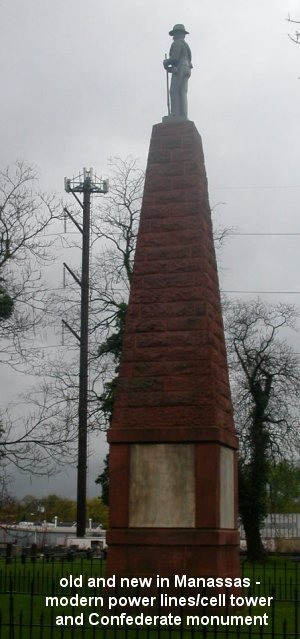 Wailing about "developers who foul up the nest" or "politicians who fail to perform" or "newcomers who clog the roads" might make some Northern Virginia residents feel better, but there is no real-world scenario where developers build new housing/offices without a profit motive, or politicians deliver on 100% of their promises, and no one new moves into the neighborhood after you.
Wailing about "developers who foul up the nest" or "politicians who fail to perform" or "newcomers who clog the roads" might make some Northern Virginia residents feel better, but there is no real-world scenario where developers build new housing/offices without a profit motive, or politicians deliver on 100% of their promises, and no one new moves into the neighborhood after you.
This region does not evolve on autopilot, immune to human interaction. People in county/city offices (and occasionally in state, regional, or Federal offices) make many decisions, large and small, that determine if the patch of forest down the street will become townhomes, a shopping center, a ballfield… or stay undeveloped as a natural area.
Many separate jurisdictions elect town councils, city councils, and boards of county supervisors to make local land use decisions in Northern Virginia. Within the boundaries of the towns, cities, and counties, those decisions may be consistent - but across the region, they are fragmented by the political geography.
There is regional coordination and regional planning regarding roads, water supply, even parks - but every city and county has a separate comprehensive plan and a separate zoning ordinance to shape the future according to a jurisdiction-specific perspective.
So who we elect to local office makes a difference. Who we elect to the state legislature, the Virginia General Assembly, is also a factor because Virginia is a Dillon Rule state. Unless the General Assembly has specifically granted some decisionmaking power to the local jurisdictions... local officials do not have the authority to act.
Blame allocation is an art practiced in many bureaucracies, but knowing who to blame is essential in understanding who can fix a problem. Don't write your congressional representative if you're upset about the proposed housing development down the road.
- For example, some local jurisdictions would like the authority to block new houses on undeveloped parcels unless "adequate public facilities" exist to handle the new residents. Unless there is space in the nearby schools, a fire station within close distance (preferably as close as 4 minutes), and room on the roads to handle the extra traffic, the new housing would be blocked until adequate public facilities were provided.
- Jurisdictions already have leverage over rezoning requests. Local governments can require proffers for new schools, road expansions, parks, and other improvements before approving increased deveopment density or a change in land use. However, local governments have no leverage on parcels already zoned for housing; "by-right" development can proceed even if schools are overcrowded and roads are jammed by congestion. Unless the General Assembly grants towns, cities, and counties additional authority, local governments may not impose an adequate public facility ordinance.
We learned in high school civics class that voters have the capacity to affect the large and small decisions. We learned on April 15 (and every time we buy something and pay 5% sales tax) that we have "skin in the game," so we should engage in the decisionmaking process.
The bottom line: you can shape the future of NOVA. No single interest group controls the future of Northern Virginia; it is not a homogenous region. Factions and political parties counterbalance each other, and there's always a few people williing to slant the facts or just sling mud. Engaging in the political process requires determination and patience, as well as knowledge and an interest in a topic.
A few people have the drive, the stamina, the ego, and the thick skin to run for office in order to shape the future directly. Before you automatically bash candidates for city/town council or the Board of County Supervisors, consider what it would take to get you energized enough to run for office. It's a different experience to play the game on the ballfield as a contact sport, rather than to watch from the bleachers, so maybe it's not so surprising that the people willing to run for office are not "normal."
However, most individuals choose to participate in government decisionmaking not as individuals, but through membership in groups such as political parties. Local politics are very different from national politics. If you use common stereotypes of Republicans and Democrats at the national level ("party of limited government" vs. "tax-and-spend" party) as your lens for viewing local NOVA political races, you'll get confused.
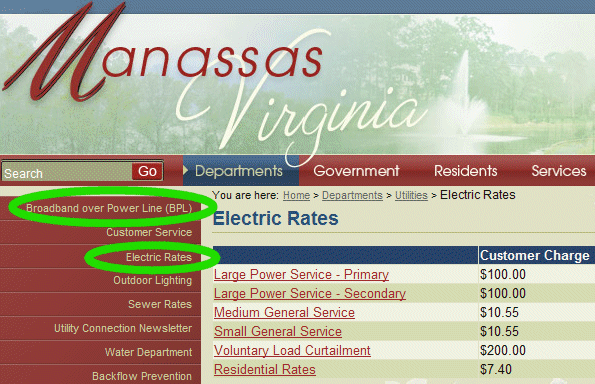 government-supplied utilities in City of Manassas
government-supplied utilities in City of Manassas
In Manassas, a City Council that has no elected Democrats runs a government that supplies electricity, Internet access through Broadband over Power Line (BPL) technology, and garbage collection services. Though you might think a Republican-controlled city would be "conservative" and limit governmental powers, Manassas implemented the first large-scale commercial use of BPL technology in North America. In Fairfax County, where local officers are heavily dominated by Democrats, electricity, garbage collection, and Internet access services are NOT provided by the local government.
It's hard for even the politically-involved to correlate national political philosophy to local issues. In Loudoun County, a Republican-dominated Board of County Supervisors was elected in 2003 to overturn tight land use controls. Two years after the election, that same board approved a restrictive land use plan, downzoning many parcels. That caused a property rights advocate to exclaim "I think these Republicans have forgotten that they are Republicans."1 (Don't be surprised if a Democratic-controlled board, which was elected in 2007, is also skewered in the next few years by its partisan advocates.)
Most of the decisions of local government deal with local issues that do not align with national partisan agendas. Even though the edges of NOVA are only 50 miles from DC (roughly), only rarely will a candidate for local office be able to highlight a political issue that also resonates nationally. That happened recently with the immigration debate in Prince William in 2007, but it was a rare moment.
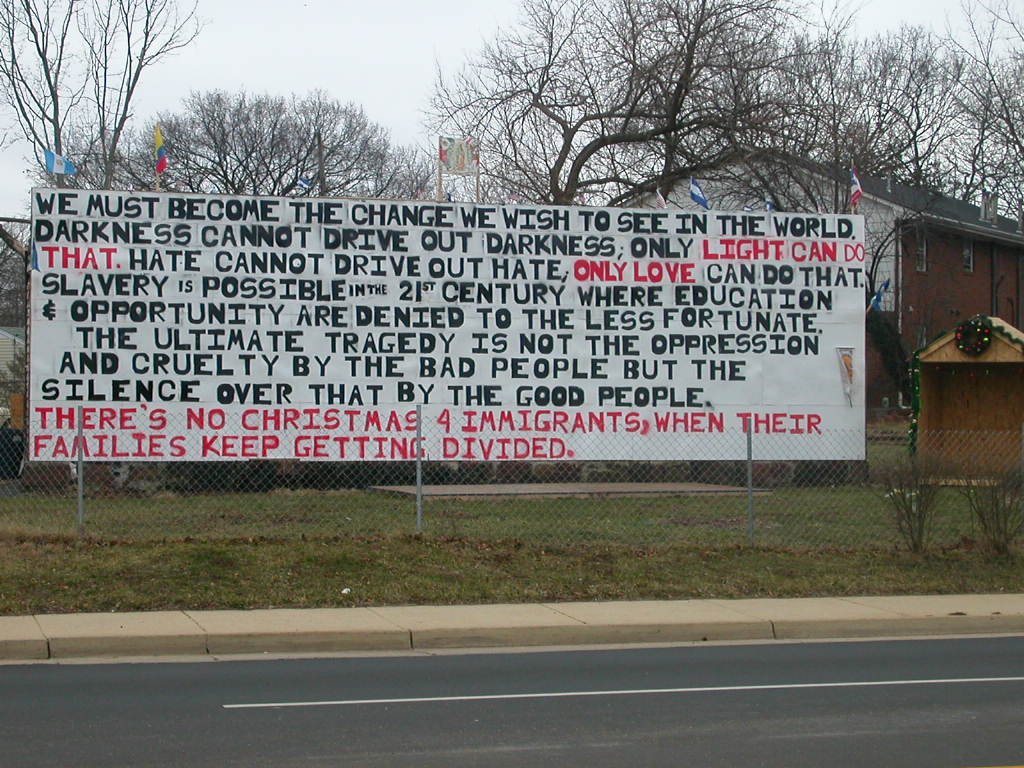 sign across from Manassas Railroad depot supporting Hispanic immigrants
sign across from Manassas Railroad depot supporting Hispanic immigrants
(in reaction to the "Help Save Manassas" movement that brought national attention to Manassas/Prince William)
Most land use issues involve how to mitigate/avoid impacts on local roads and schools. "Fixing potholes" is rarely partisan. Factions on the elected boards/councils divide over personalities and very local interests more than national parties. Politicians who choose to serve at the local level may build a track record for future races to state/local office, but tough decisions on local issues also create disappointments and enemies. It is not a sure stepping stone to "higher" state/Federal office.
NOTE: local office is a "high" office. There are 9 members on the Fairfax County Board of County Supervisors elected by districts, plus a chair elected countywide, so each member represents over 100,000 people. In Prince William County, the 7 members elected by district (plus a countywide chair) represent 55,000 people. That's a pretty hefty responsibility...
At the national level, elected officials can tax/borrow and spend, increasing the national debt. At the local level, budgets must be balanced so the rhetoric about "holding the line on taxes" bumps into the promises to increase pay for police officers, or build the new high school. Officials can borrow money for capital improvements such as building new schools, but over the next 20 years local tax revenues must be kept high enough to repay the bonds (with interest, of course).
Each year, the budget process forces hard choices. The discipline required by having to balance the budget annually stops local officials from creating lots of "pilot" or "demonstration" programs that might grow later, and in the short run will cater to narrow interest groups. The inevitable shift to the center, based on compromises between opposite opinions in order to pass the budget, will result in votes that blur the distinctions between Republican and Democrat.
In Prince William County, for example, "Republicrats" are common. You'll see Democratic officials at fundraisers for Republican candidates, and vice-versa.
The Republican member of the House of Delegates who represented Manassas, and the Democratic member of the State Senate who represented the surrounding region, rode together to meetings of the General Assembly and once held a joint fundraiser. The elected officials belonged to different parties, but shared a common viewpoint on many issues (such as obtaining state funds to build the GMU campus in Prince William).
Alexandria and Arlington have been strongholds of the Democratic Party for decades. Blogs joke about the "People's Republic of Arlington," where no Republicans hold office. In the last decade, the Democrats have expanded their domination to Fairfax County. The pattern of party alignment for the State Senate districts shows the Republican districts are on the periphery - except for the 37th District, when Ken Cuccinelli won his race in 2007 by only 101 votes.
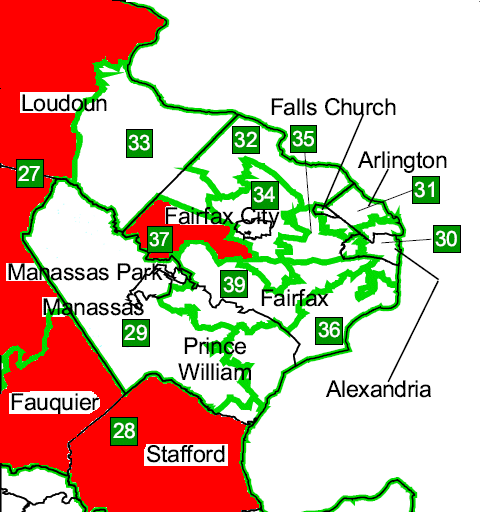 NOVA members in State Senate (districts on periphery represented by Republicans shown in red)
NOVA members in State Senate (districts on periphery represented by Republicans shown in red)
In the House of Delegates, the pattern is similar. There are two Republicans representing portions of Fairfax County, while other delegates inside the Beltway are Democrats. On the periphery, all delegates are Republicans representing Stafford, Prince William, Fauquier, and Loudoun,. except for two sections of Loudoun and Prince William where Democrats were elected.
The inner suburbs have become reliable supporters for Democratic candidates, so the fierce contests of the future may occur within the party primaries and caucuses. Inside the Beltway, nomination by the Democratic Party may become "tantamount to election" just as it was in the days of the old Byrd machine (when the poll tax and other techniques kept the electorate very small, and Democrats dominates state and local government.
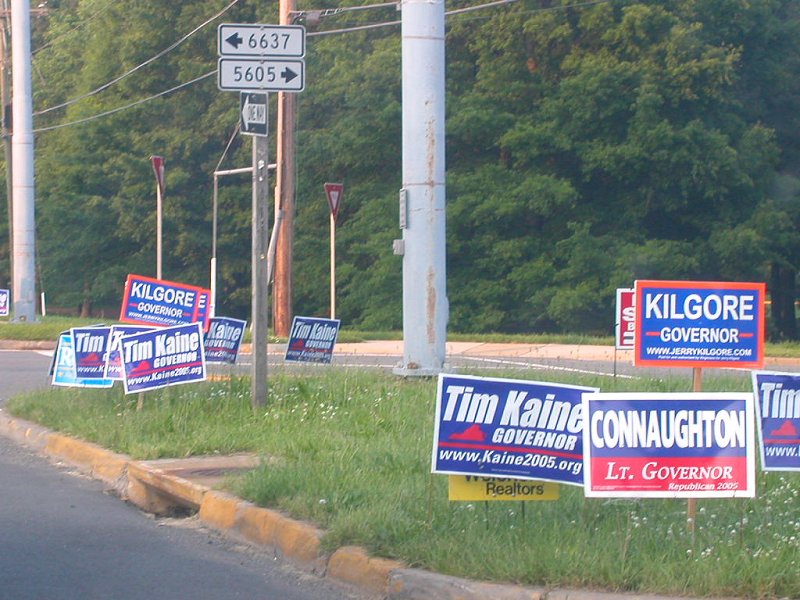 2005 election signs
2005 election signs
Across the state, moderates are being purged in primaries/caucuses. The powerful state senator representing western Loudoun County and the delegate representing Stafford County (who was Speaker of the House) were affected by the polarization of the electorate, and both chose to retire in 2007. Since boundaries of political districts are drawn by incumbents every 10 years after the Census, it should be no surprise that gerrymandered boundaries protect incumbents and ensure most seats are "safely Democratic" or "safely Republican."
In the 2011 redistricting, new boundaries will be drawn for districts in Northern Virginia. Look for incumbent Republicans to try to add precincts that vote Republican to their districts, while removing precincts dominated by Democrats. Look for Democrats to do the opposite. Since the Democrats are concentrated inside the Beltway and Republicans dominate outside the Beltway, look for the only competitive districts in our region to be on the southern/western edges of Fairfax and the eastern/northern edges of Loudoun/Prince William.
However, another possibility is that the Republicans representing Fairfax will not count on their fellow members of the General Assembly to protect their districts. Redistricting is a statewide process, and other regions have bargains to be cut. It is possible that one or more of the districts of Republican incumbents in Northern Virginia could be sacrificed to the Democrats, in exchange for a tradeoff in drawing other district boundaries in the Hampton Roads, Richmond, or Roanoke regions. This may be one reason that Ken Cuccinelli has announced plans to run for a statewide office in 2009 (Attorney General), halfway through his 4-year term as a state senator.
In Virginia's General Assembly, the House of Delegates is controlled by Republicans and the State Senate is controlled by Democrats right now. (Next elections will be in 2009 for delegates, and in 2011 for state senators.) So far, the elected politicians have rejected plans for a non-partisan group to redraw the boundaries of legislative districts after the 2010 Census. Read:
References
1. "Loudoun Supervisors Vote For New Curbs on Growth," Washington Post, July 21, 2005, http://www.washingtonpost.com/wp-dyn/content/article/2005/07/20/AR2005072002229.html"> (last checked April 22, 2008)
Future of NOVA
Northern Virginia
Virginia Places
 Wailing about "developers who foul up the nest" or "politicians who fail to perform" or "newcomers who clog the roads" might make some Northern Virginia residents feel better, but there is no real-world scenario where developers build new housing/offices without a profit motive, or politicians deliver on 100% of their promises, and no one new moves into the neighborhood after you.
Wailing about "developers who foul up the nest" or "politicians who fail to perform" or "newcomers who clog the roads" might make some Northern Virginia residents feel better, but there is no real-world scenario where developers build new housing/offices without a profit motive, or politicians deliver on 100% of their promises, and no one new moves into the neighborhood after you.



